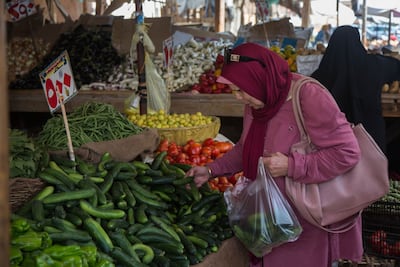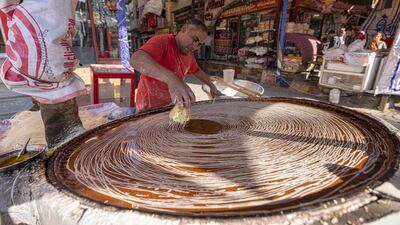Egypt’s annual Ramadan food drives will launch three months earlier than usual in 2023, a supply ministry official said.
The next drive, in which food items are sold to the country’s poorer citizens at reduced prices, usually start two weeks before the holy month.
But during a drop in the supply of essential food items and a shortage of foreign currency needed to release them from ports, Egypt's government has decided to launch the next drive early.
“The decision to make these goods available is first to put people at ease that the most essential goods they might need during Ramadan are available in sufficient quantities,” said deputy supply minister Ibrahim Ashmawy.
He said it would also give people ample time to stock up on food items ahead of Ramadan.
In the first two months of the drives, only essential goods such as rice, pasta, cooking oil and meats will be sold at the various government outlets that will be set up in Egypt’s 27 provinces to distribute the discounted goods, Mr Ashmawy said.
Goods used in traditional Ramadan dishes, including dried fruit and nuts, will be made available at the outlets closer to the holy month to ensure they are fresh, he said.
Cheaper goods
The outlets will be open in tandem with private sector shops that will most likely sell the same goods at a higher price.
Goods at government outlets will be about 7 per cent to 10 per cent cheaper than their counterparts at private sector outlets, said Mohamed Al Masry, deputy chief of the country’s Federation of Chambers of Commerce.
Egypt’s ministries of supply and agriculture will set up separate distribution outlets nationwide to distribute the goods.
More outlets will be organised by the country’s armed forces, which own a large number of food manufacturing companies.
The government hopes that increasing its supply of foodstuffs at discounted outlets will in turn reduce citizens’ demand for the more expensive alternatives available at private sector shops.
Mr Ashmawy said this would force private traders to bring down prices.
Traders are repeatedly accused by the government of profiteering and cornering the market.
“It’s a matter of simple economics, if we increase the supply of these goods in the market, it will mitigate prices all around,” he said.

With year-on-year inflation hitting a five-year high of 18.7 per cent in November, prices have continued to rise dramatically for Egyptians.
This month, the government took steps to mitigate the price increases, including promising to enforce a “fair price range” on goods sold at private sector shops. Yet throughout December, prices for almost every food item continued to rise.
It has increased the number of state-subsidised food items holders of food cards can buy, raised the minimum wage, increased pensions and put off at least twice planned increases in electricity charges.
Mr Ashmawy said the government’s subsidy bill rose from 321 billion Egyptian pounds last year ($21.4 billion by 2021’s exchange rate) to 354 billion this year ($14.3 billion, according to the current exchange rate).
Although the bill is lower in dollars than the previous year, two consecutive currency devaluations in 2022 resulted in a drop of more than 30 per cent in the value of the Egyptian pound against the dollar and a subsequent rise in government expenditure in the domestic currency.
Mr Ashmawy said the devaluations had also contributed to the increase in import prices this month.
In September, the government fixed the price of rice until March at 12 Egyptian pounds (about $0.50) a kilogram when sold loose and 15 pounds when packed.
Egypt moves to boost local wheat farming amid war in Ukraine - in pictures
On Monday, Prime Minister Moustafa Madbouly said goods worth about $4.8 billion were released from ports in December. He said about $700 million of that went towards releasing food items with the rest used to release medicine, fuel and raw materials for various industries.
While speaking at the opening of a factory for gases used for medical purposes on Monday, President Abdel Fattah El Sisi said the state will do its utmost to secure dollars for the release of imports over the next few months.
Mr Madbouly said there was about $9.5 billion worth of goods still held up at ports. He said over the next four months, a further $4.5 billion in goods would be released.
“We are trying as much as we can to check the increase of prices,” Mr El Sisi said on Monday.
However, Mr Al Masry said on Thursday that price stability at Egypt’s markets is still very much at the mercy of developments in the Russia-Ukraine war, which the government has repeatedly blamed for the current economic conditions.
The warring countries provide a large portion of Egypt’s wheat and grain imports, in addition to providing more than 30 per cent of its tourists every year, an essential channel for foreign currency.












